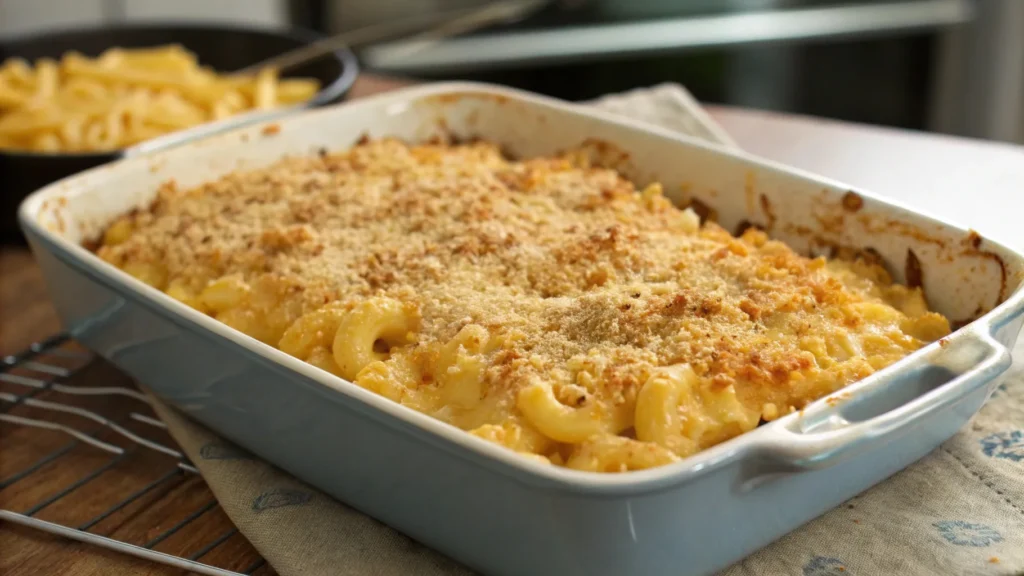Can you freeze mac and cheese? If you’ve ever wondered whether your favorite comfort food can survive the chill of a freezer, you’re not alone! Picture this: you’ve just made a creamy, cheesy batch of smoked gouda mac and cheese, and there’s too much to finish. Tossing it feels like a crime, but can you really save it for later without ruining its ooey-gooey magic? This question has crossed the minds of busy families and mac-and-cheese lovers alike, and the answer might surprise you.
Craving the ultimate smoked mac and cheese of 2025? Indulge in this creamy, smoky take on a classic comfort favorite! Discover the best smoked mac and cheese recipe of 2025.
Next, imagine biting into perfectly reheated mac and cheese that tastes just as delicious as it did on day one. Whether you’re meal-prepping for a hectic week or simply hate wasting food, learning how to freeze and reheat dishes like smoked mac and cheese opens up endless possibilities. Keep reading to discover simple tips, fun hacks, and pro tricks to make it happen effortlessly!
urious about the best sides for your mac and cheese? Explore this guide: What to Serve with Mac and Cheese? for delicious pairing ideas to enhance your meal!
Table of contents
Can you freeze mac and cheese?
The Basics of Freezing Mac and Cheese

Preparing Mac and Cheese for Freezing
Freezing mac and cheese is easy when you start with the right preparation. First, let your dish cool completely. Freezing hot mac and cheese can cause condensation, leading to a watery texture. Next, portion it out into smaller servings. This makes thawing more manageable and reduces waste. To maintain its rich, cheesy flavor, sprinkle a bit of shredded smoked gouda on top before freezing. Then, wrap the dish tightly with plastic wrap or foil to prevent freezer burn.
Additionally, a quick blanch of your macaroni before combining it with the sauce can help preserve its texture. Avoid overcooking the noodles initially, as they may soften further during reheating.
Here’s a quick prep checklist:
- Cool mac and cheese completely.
- Divide into single servings.
- Sprinkle cheese for added flavor.
- Wrap tightly to prevent freezer burn.
Taking these simple steps ensures your mac and cheese stays delicious!
Best Containers for Freezing Mac and Cheese
Using the right containers can make a huge difference in how well your mac and cheese freezes. Airtight containers are the best choice because they keep moisture out, preserving flavor and texture. Freezer-safe glass containers are ideal for reheating directly. Alternatively, heavy-duty freezer bags work well for saving space.
Here’s a comparison table for container options:
| Container Type | Benefits | Drawbacks |
|---|---|---|
| Airtight glass containers | Easy reheating, durable | Take up more space |
| Heavy-duty freezer bags | Space-saving, affordable | Not reusable, less eco-friendly |
| Aluminum trays | Great for oven reheating | Single-use, can bend easily |
Label each container with the freezing date and reheating instructions. This small detail makes things easier when you’re ready to enjoy your frozen mac and cheese.
Tips for Freezing Different Types of Mac and Cheese

Freezing Smoked Mac and Cheese Variations
Smoked mac and cheese freezes well and retains its smoky flavor when handled properly. Start by using a smoked mac and cheese recipe that includes cheeses like gouda or cheddar, as they freeze better. Divide the dish into portions for easier reheating. Cover each portion tightly to lock in the smoky aroma.
Adding breadcrumbs as a topping? Freeze them separately in a small bag. This keeps them crispy when reheated. When you’re ready to enjoy, sprinkle them on top before baking.
Here’s what to keep in mind:
- Use smoked cheeses for better results.
- Freeze breadcrumbs separately for crispiness.
- Wrap portions tightly to preserve flavor.
With these tips, your smoked mac and cheese will taste just as good after freezing!
Freezing Mac and Cheese Without Milk
Mac and cheese without milk can still freeze beautifully with a few adjustments. Use a creamy base like cream cheese or heavy cream instead. These ingredients freeze better than milk and won’t separate as much when thawed. Portion your dish into freezer-safe containers and ensure they’re airtight.
Steps for freezing milk-free mac and cheese:
- Replace milk with cream cheese or heavy cream.
- Cool the dish before freezing.
- Wrap or seal it tightly to lock in freshness.
A little preparation goes a long way in keeping your mac and cheese delicious and creamy!
Thawing and Reheating Mac and Cheese Safely

How to Thaw Frozen Mac and Cheese Properly
Thawing mac and cheese is a breeze if done right. Always defrost it in the fridge overnight. This ensures even thawing and prevents bacterial growth. If you’re in a hurry, use the microwave’s defrost setting, but check it frequently to avoid uneven heating.
For best results:
- Thaw overnight in the fridge.
- Use the microwave’s defrost setting for faster results.
Gradual thawing preserves the dish’s flavor and texture, ensuring your mac and cheese is as tasty as when it was freshly made.
Reheating Tips for Maintaining Texture and Flavor
Reheating mac and cheese while keeping it creamy requires a few tricks. Add a splash of milk or cream before reheating to bring back its original texture. Use an oven at 350°F for even heating or reheat on the stove for smaller portions.
Additional tips:
- Cover with foil to retain moisture in the oven.
- Stir frequently when reheating on the stove.
These methods ensure your reheated mac and cheese tastes as good as fresh!
| Reheating Method | Best For | Tips |
|---|---|---|
| Oven (350°F) | Large portions | Cover with foil, add milk for creaminess |
| Stove | Small servings | Stir often, add a splash of milk |
| Microwave | Quick reheating | Use low power, stir halfway through |
Common Issues and Solutions When Freezing Mac and Cheese
Why Mac and Cheese Becomes Grainy After Freezing
Graininess occurs when the cheese sauce separates during freezing. To avoid this, use cheeses that freeze well, like cheddar or gouda. Adding a stabilizer, such as a small amount of flour or cornstarch, can help.
For smooth results:
- Use high-fat cheeses.
- Add stabilizers like flour.
- Avoid overcooking before freezing.
Taking these steps ensures a creamy texture even after freezing.
How to Prevent Dryness in Frozen and Reheated Mac and Cheese
Dryness is a common issue, but it’s easy to fix. Add a splash of milk or cream before reheating. Cover the dish tightly during freezing to lock in moisture.
Tips to keep mac and cheese moist:
- Add extra sauce before freezing.
- Cover tightly with foil while reheating.
These small adjustments make a big difference in keeping your dish creamy and delicious!
Frequently Asked Questions about Freezing Mac and Cheese
Yes, smoked gouda mac and cheese freezes beautifully! Its high-fat content helps retain flavor and texture. For best results, portion it into airtight containers and freeze within two hours of cooking.
Frozen mac and cheese stays fresh for up to three months. Label each container with the freezing date to track storage time.
Part2
Smoking mac and cheese typically takes about 1 to 2 hours at 225°F for the best smoky flavor.
For 100 people, you’ll need approximately 25 pounds of mac and cheese. This ensures everyone gets a generous serving.
Plan for about 1/2 cup to 1 cup of mac and cheese per person, depending on whether it’s a side dish or main course.
Mac and cheese pairs well with barbecue, salads, roasted vegetables, or even a slice of toasted garlic bread.
Part3
Yes, almond milk works as a substitute for regular milk in mac and cheese, though it may slightly alter the flavor.
Yes, buttermilk adds a tangy flavor to mac and cheese. It also enhances the creaminess of the dish.
National Mac and Cheese Day is celebrated on July 14th every year.
Yes, mac and cheese can be made in the microwave. It’s a quick way to prepare a single-serving dish.
Part4
Yes, cooked macaroni can be frozen. Store it in an airtight container for up to 3 months.
Yes, mac and cheese freezes well if stored properly. Ensure it’s in an airtight container to maintain quality.
Traditional mac and cheese is vegetarian, but check for animal-based rennet in cheeses used.
Cheese is typically smoked at temperatures below 90°F to avoid melting while infusing flavor.
Part5
Yes, homemade mac and cheese can be frozen. Ensure it’s cooled and stored in a sealed container.
Defrost frozen pasta in the fridge overnight or run it under warm water for faster results.
Yes, mac and cheese is braces-friendly as it’s soft and easy to chew.
Yes, you can prepare mac and cheese in advance. Store it in the fridge and bake it before serving.
Part6
To fix dry macaroni and cheese, add a splash of milk or cream, stir, and warm it gently over low heat. You can also mix in some melted butter or cheese to restore creaminess.
Mac and cheese isn’t ideal for dogs. It contains dairy and high levels of fat, which can upset their stomachs.
Cheese generally melts at temperatures between 130°F and 180°F, depending on the type of cheese.
Macaroni cheese isn’t ideal for freezing because the cheese sauce may separate upon reheating, affecting the texture and flavor.
Part7
Mac and cheese pairs well with roasted vegetables, grilled chicken, or a fresh side salad for a balanced meal.
Cheese can sit out for about two hours at room temperature. After that, it’s best to refrigerate it to maintain freshness.
Yes, you can freeze mac and cheese. Make sure it’s cooled completely and stored in an airtight container before freezing.
Mac and cheese can be part of a balanced diet in moderation. Opt for whole grain pasta or add vegetables for a healthier version.
Part8
Mac and cheese is believed to have been invented in Europe, with early recipes dating back to the 14th century.
Yes, you can make mac and cheese without milk. Substitutes like almond milk, broth, or water can be used instead.
To smoke cream cheese, place it on a smoker at 200°F for about two hours until it absorbs a smoky flavor.
Mac and cheese can be enjoyed in moderation. Adding vegetables or lean protein can make it more nutritious.
Part9
Mac and cheese pairs wonderfully with barbecue, roasted vegetables, or crispy fried chicken for a complete meal.
Mac and cheese has roots in 14th-century Italy. It became popular in the U.S. due to its simplicity and deliciousness.
Mac and cheese stays good in the fridge for 3 to 5 days when stored in an airtight container.
To make a roux, melt butter in a pan, add equal parts flour, and stir until smooth before adding milk or cheese.
Part10
Mac and cheese originated in Italy and became a beloved dish worldwide, with variations evolving over time.
The exact origin of mac and cheese is unclear, but it was popularized in the U.S. by Thomas Jefferson and his chef.
Mac and cheese should not sit out for more than 2 hours at room temperature to prevent bacterial growth.
Yes, mac and cheese is soft and easy to chew, making it suitable after a tooth extraction.
Part11
Yes, mac and cheese expires. Store-bought versions have a best-before date, and homemade versions last 3-5 days in the fridge.
Signs of bad cheese include mold (except for certain types), a sour smell, or a slimy texture.
Early versions of mac and cheese date back to the 14th century, with recipes appearing in Italian cookbooks.
The first known mac and cheese recipe is from an Italian cookbook in the 14th century, but it’s unclear who first made it.
Part12
Macaroni cheese has origins in Italy and was further popularized in other parts of Europe and America.
Yes, you can freeze mac and cheese. Ensure it is stored in an airtight container and consumed within a few months.
To thicken mac and cheese, add a roux, cornstarch slurry, or more cheese while stirring over low heat.
Grainy mac and cheese often results from overheating the cheese, causing it to separate. Use low heat and stir gently.
part13
Yes, mac and cheese can be frozen for future use. Store it in a freezer-safe container and reheat thoroughly when ready.
Cheese typically takes 2-4 hours to smoke, depending on the desired level of smokiness and the type of cheese.
Mac and cheese is not inherently gluten-free but can be made so by using gluten-free pasta and thickeners.
To smoke mac and cheese, prepare it as usual, then place it in a smoker at 225°F for about 1-2 hours.
Part14
Yes, you can make mac and cheese without butter. Substitute it with olive oil or other fats for a similar effect.
Yes, mac and cheese can go bad. Refrigerate it promptly and consume it within 3-5 days to ensure freshness.
Mac and cheese can stay in the fridge for 3-5 days when stored properly in an airtight container.
Cold smoking cheese typically takes 2-4 hours, depending on the desired level of smokiness.
Part15
Mac and cheese has Italian origins but has been adapted in many cuisines worldwide, especially in America.
Mac and cheese lasts 3-5 days in the fridge when stored in an airtight container.
Mac and cheese stays good for 3-5 days in the fridge and up to 2 months in the freezer.
Conclusion: Enjoying Mac and Cheese Anytime, Anywhere
Yes, you can freeze mac and cheese, and it’s super easy to do! Whether it’s homemade or store-bought, freezing helps you save leftovers or prepare meals ahead of time. First, let the dish cool completely. Then, portion it into freezer-safe containers. This keeps it fresh and ready to reheat. When you’re ready to enjoy it, thaw it overnight in the fridge for the best texture. You can also reheat it straight from frozen if you’re in a hurry. Adding a splash of milk or cream while reheating makes it creamy again. Freezing mac and cheese doesn’t change the delicious flavor. It just makes it convenient to enjoy anytime. Plus, it’s a smart way to avoid waste. So, go ahead and give it a try. With a little planning, you’ll always have a comforting meal waiting for you. Enjoy your mac and cheese adventure!
